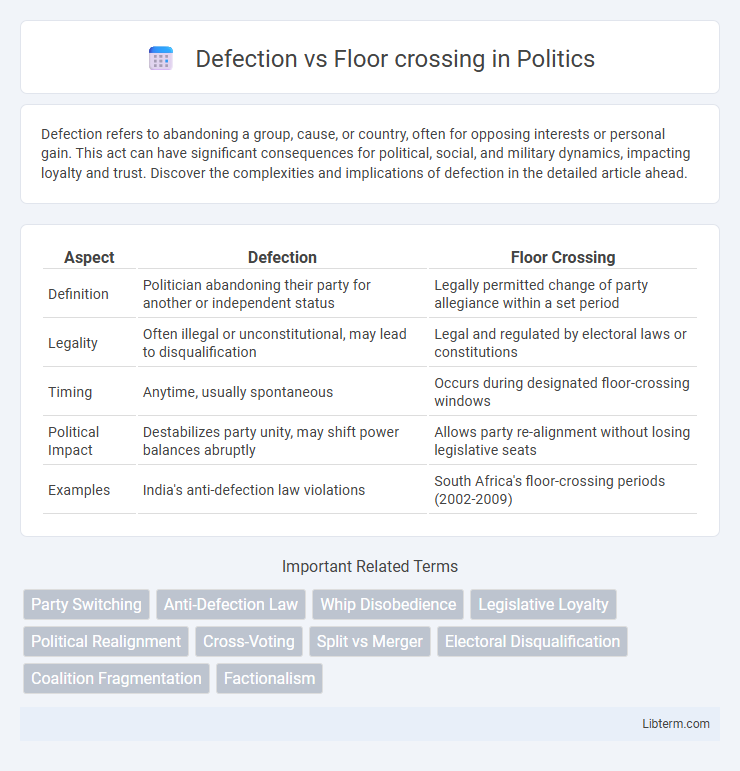Defection refers to abandoning a group, cause, or country, often for opposing interests or personal gain. This act can have significant consequences for political, social, and military dynamics, impacting loyalty and trust. Discover the complexities and implications of defection in the detailed article ahead.
Table of Comparison
| Aspect | Defection | Floor Crossing |
|---|---|---|
| Definition | Politician abandoning their party for another or independent status | Legally permitted change of party allegiance within a set period |
| Legality | Often illegal or unconstitutional, may lead to disqualification | Legal and regulated by electoral laws or constitutions |
| Timing | Anytime, usually spontaneous | Occurs during designated floor-crossing windows |
| Political Impact | Destabilizes party unity, may shift power balances abruptly | Allows party re-alignment without losing legislative seats |
| Examples | India's anti-defection law violations | South Africa's floor-crossing periods (2002-2009) |
Introduction to Defection and Floor Crossing
Defection refers to a political representative abandoning their party allegiance to join another party, often impacting party stability and legislative dynamics. Floor crossing involves lawmakers formally switching party affiliation while retaining their legislative seats, typically during designated periods or under specific legal provisions. Both practices significantly influence party composition, legislative balance, and governance outcomes in parliamentary systems.
Defining Defection in Political Context
Defection in a political context refers to the act of a politician abandoning their party allegiance to join another party or become independent, often driven by ideological differences or strategic advantages. This phenomenon impacts party cohesion and legislative stability, influencing government formation and policy-making processes. Unlike floor crossing, defection specifically implies a more permanent shift in political loyalty rather than a procedural or temporary change.
Understanding Floor Crossing
Floor crossing refers to the act of elected representatives switching allegiance from the political party under which they were elected to another party without losing their legislative seat. This practice enables politicians to realign themselves with different political ideologies or parties, often impacting the balance of power within legislative bodies. Understanding floor crossing is essential for comprehending shifts in party dynamics and maintaining democratic accountability in parliamentary systems.
Key Differences Between Defection and Floor Crossing
Defection involves an elected representative abandoning their original political party to join another party or become independent, often leading to by-elections or legal consequences depending on jurisdictional anti-defection laws. Floor crossing specifically refers to the act of a legislator switching allegiance from one political party to another within a legislative body, sometimes permitted during designated periods without penalties. Key differences lie in the legal frameworks governing these actions, the timing restrictions imposed on floor crossing, and the implications on party composition and legislative stability.
Legal Frameworks Governing Defection
Legal frameworks governing defection primarily address the unauthorized shift of elected representatives from one political party to another, often resulting in penalties or disqualification under anti-defection laws to maintain political stability. These laws vary by country but typically outline conditions under which defection leads to loss of seat, including voluntary resignation or voting against party directives. Courts frequently interpret these statutes to balance party discipline with representatives' freedom, shaping enforcement mechanisms and political consequences.
Floor Crossing: Legal and Ethical Considerations
Floor crossing involves elected representatives switching party allegiance during their tenure, raising complex legal and ethical issues related to voter mandate and political stability. Legally, many jurisdictions regulate or prohibit floor crossing to ensure party loyalty and protect electoral integrity, with consequences including loss of parliamentary seats or disqualification. Ethically, floor crossing challenges principles of democratic representation and accountability, as it may conflict with the voters' original mandate and erode trust in political institutions.
Impact of Defection on Political Stability
Defection significantly undermines political stability by weakening party cohesion and eroding voter trust, often leading to fragmented legislatures and unstable governments. Frequent defections can disrupt policy continuity and provoke electoral volatility, creating an unpredictable political environment. This instability hampers effective governance and may trigger early elections or coalitions that struggle to maintain control.
Consequences of Floor Crossing on Governance
Floor crossing undermines political stability by enabling elected representatives to switch parties without triggering by-elections, often leading to unpredictable shifts in parliamentary majorities. This practice can weaken party discipline, dilute voter mandate, and disrupt coherent policy implementation, resulting in governance inefficiencies. Persistent floor crossing may erode public trust in democratic institutions, as it blurs accountability and compromises the integrity of representative democracy.
Global Case Studies: Defection vs Floor Crossing
Defection involves elected representatives abandoning their political party to join another, often impacting government stability, as seen in India's anti-defection law cases where legislators switched parties during critical votes. Floor crossing refers to the formal process allowing legislators to change parties without losing their seats, exemplified by South Africa's constitutional amendments permitting periodic floor crossing to accommodate shifting political alliances. Comparative global case studies highlight that defection typically leads to legal repercussions and electoral instability, whereas regulated floor crossing fosters political realignment within established legal frameworks.
Conclusion: Navigating Political Realignments
Defection and floor crossing both signify shifts in political allegiance, impacting party stability and legislative dynamics. Understanding the legal frameworks and political contexts governing these actions is crucial for managing potential instability. Effective navigation of political realignments requires clear regulations and strategic dialogue to maintain democratic integrity and governance continuity.
Defection Infographic

 libterm.com
libterm.com